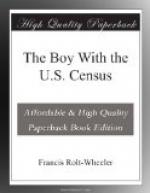“I told Sinclair,” the supervisor continued, “that I thought he ought to be ten times prouder of the success of his pupil than of the merits of an examination paper, because it took a higher degree of ability to teach well than merely to answer a set of test questions, and the boy must have been wonderfully well taught to achieve so much. He agreed with me, of course, but I could see that it irked him a little just the same. He volunteered, however, to assist his pupil as much as he could.”
“That was very decent of him, I think,” Hamilton said, “lots of men would have borne a grudge. But did you say his name was Sinclair?”
“Yes,” the supervisor answered, “Gregory Sinclair. Why?”
“And you said he had been in the mountains?”
“Quite a good deal.”
“Then that must be Bill Wilsh’s teacher,” exclaimed Hamilton, and he told the supervisor the story of the “cunjer,” the whittled schoolhouse and the “trying” scholar. “I’ve got the carving still,” he concluded, “and as you probably will see Mr. Sinclair again soon, I wonder if you would give it to him for me. Don’t forget to tell him that the door was made to appear open, to show him that he was expected back.”
“Of course, I shall be glad to give it to him,” the supervisor answered, “and from what I know of Sinclair, I feel sure he will go back, though probably only in the holidays and for a visit. Where is this carving?”
“At the hotel, sir,” the boy answered, “I’ll bring it over this afternoon. I’m sorry not to have had the chance of seeing him myself, he must be a fine chap.”
“He is,” the supervisor agreed, “and he showed the stuff he was made of in connection with this poor lad in his school. I happen to know that he really put in a lot of time helping Wurtzi in order that he might make good.”
“You said the boy was Polish?”
“Polish, of the stock that’s making another country out of the deserted districts of New England. Land that has been abandoned by the Americans the Poles are making productive. That’s where the real wealth of the future is coming in—from the people who will work the ground without exhausting it as reckless landowners formerly have done all through this country. Many a farm has had its soil so robbed of nourishment that its fertility will take years and years to return. These European peasants, however, are so used to making much of a small plot that they are redeeming the ground. You know, I’m one of those that believe in all the immigration possible, and I’ve never forgotten one of Broughton Brandenburg’s sayings about it.”
“What was that?” asked the boy.
“That ’it is always the most ignorant immigrant that makes the best citizen.’”
“I certainly don’t see that,” Hamilton replied.
“He absorbs Americanism more quickly,” the other explained. “For example, there’s no class hatred idea to be fought down, no anarchistic tendencies, no desire to turn liberty into license. The ignorant immigrant comes to work, he gets a job immediately, he finds that there is good pay and steady employment for a man who does work. There’s not one in ten thousand of that kind that does not prosper from the day he lands. But you’ll hear all sorts of ideas and suggestions in Washington. When do you go?”




